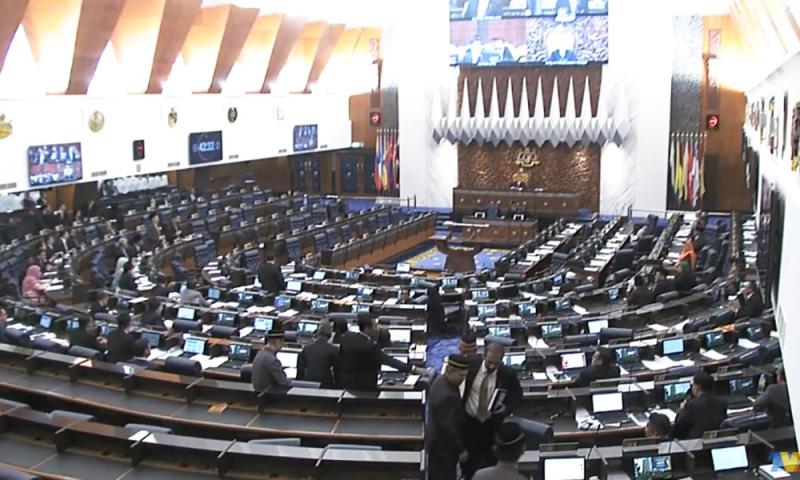A parliamentary perspective: Why PAS’ confidence motion will not succeed
COMMENT | On Feb 8, 2020, PAS deputy president Tuan Ibrahim Tuan Man and secretary-general Takiyuddin Hassan announced in a press conference that the party’s central working committee had unanimously decided to table a confidence motion for Prime Minister Dr Mahathir Mohamad, in the upcoming Parliament sitting which will commence on March 9, 2020, to support him to complete his full term as prime minister.
In the past, PAS had tabled a no-confidence motion against their own Kelantan menteri besar in the state assembly in October 1977. However, what PAS is going to table in the Parliament now is not a no-confidence motion but a confidence motion.
In this article, a parliamentary perspective is provided, on why PAS’ confidence motion will not succeed and under what situation the party's motion would take a different path.
Why won’t PAS’ motion succeed?
A motion tabled by a PAS member of parliament (MP) is different from a motion tabled by a minister, where the former is an ordinary MP’s motion, which is a non-government business, and the latter is a government motion, which is government business.
According to the Standing Orders of the Dewan Rakyat of the Parliament, government business is being given priority in the Order of Business. Only if all government business are completed, then the sitting shall proceed to non-government business.
What constitutes government business? All motions and bills tabled by the prime minister, deputy prime minister, ministers and deputy ministers, are government business.
What then is a non-government business? All motions and bills tabled by private members or ordinary MPs.
So, what then is an ordinary MP? Basically, apart from the prime minister, deputy prime minister, ministers and deputy ministers, all MPs – be it from the opposition or backbenchers of the ruling party, are ordinary MPs.
As an ordinary MP, a PAS MP’s motion must have gone through the following procedure before being debated:
Firstly, the motion should be moved in accordance with the procedure within the constitutional framework, without any mistake. Even a technical error may result in the motion being invalidated.
Secondly, the motion must be accepted by the speaker. If the speaker refuses to accept it, the motion would be considered aborted and being doomed in the speaker’s office.
Thirdly, once the motion is accepted by the speaker, it will only be listed in the Order Paper and left alone.
Fourthly, ordinary MP’s motions being listed in the Order Paper are non-government business. Once the Dewan completed all government business, they shall proceed to the non-government business.
The reality is that as the Parliament conducts its meetings, there would be more government business being added to the Order Paper, so the ordinary MP’s motions which are being queued behind government business would be eventually dumped.
However, before a submitted confidence motion can be dumped, it would become a highly political issue for some time. An example of such would be the ordinary MP’s motion submitted by PAS president Hadi Awang during the few years before the General Election in 2018, where he sought for the Dewan to accept his Private Members’ bill, known as the “355 Bill”.
Nevertheless, under usual circumstances, the tabling of PAS’ motion would not succeed. But what sort of development shall we expect for the issues being played up upon the submission of the motion as well as the entire process?
If there is an unexpected event, then it would be an unusual situation, which means that there would be a different path taken by the PAS motion which is supposed to be left unsettled.
Based on what happened to Hadi’s ordinary MP’s motion for his “355 Bill”, it is clear that the either the prime minister or the relevant minister may give precedence to an ordinary MP’s motion, as empowered by the Standing Orders. If this happens, it would put the ministers and deputy ministers in the current cabinet into a difficult situation, therefore the possibility for this to happen is very low.
What this article explains seems to be about the parliamentary procedure, but whether a confidence motion is being accepted concerns the prime minister’s position and his cabinet, which is a serious matter. What is being involved behind the scene is the national politics which is of everyone’s concern.
The functioning of parliamentary democracy is important in present-day politics, but when it comes to major national issues, politics tends to be more prominent than the legislative process.
Even if PAS submits this confidence motion in the March parliament meeting, based on constitutionality and realpolitik, the ruling coalition may hold a meeting to decide whether the prime minister would stay or go, before PAS’s motion advances to a crucial step.
As long as the ruling coalition holds the working majority in the Parliament, the coalition consensus would be following the constitutional consensus (which means the ruling coalition must hold more than half in the Parliament) as demanded by the Federal Constitution, therefore pre-emptively ending this mess, at least for the moment.
Notwithstanding that, based on the current situation, the opposition’s confidence motion will be more likely to end at a certain stage of an ordinary MP’s motion and would be inconclusive. However, we shall see whether the process would escalate matters in politics.
During those days, a “Hadi motion” had wreaked havoc. Will PAS’ confidence motion succeed this time?
OOI HENG is chief coordinator of the Backbenchers Council.
The views expressed here are those of the author/contributor and do not necessarily represent the views of Malaysiakini.
RM12.50 / month
- Unlimited access to award-winning journalism
- Comment and share your opinions on all our articles
- Gift interesting stories to your friends
- Tax deductable
